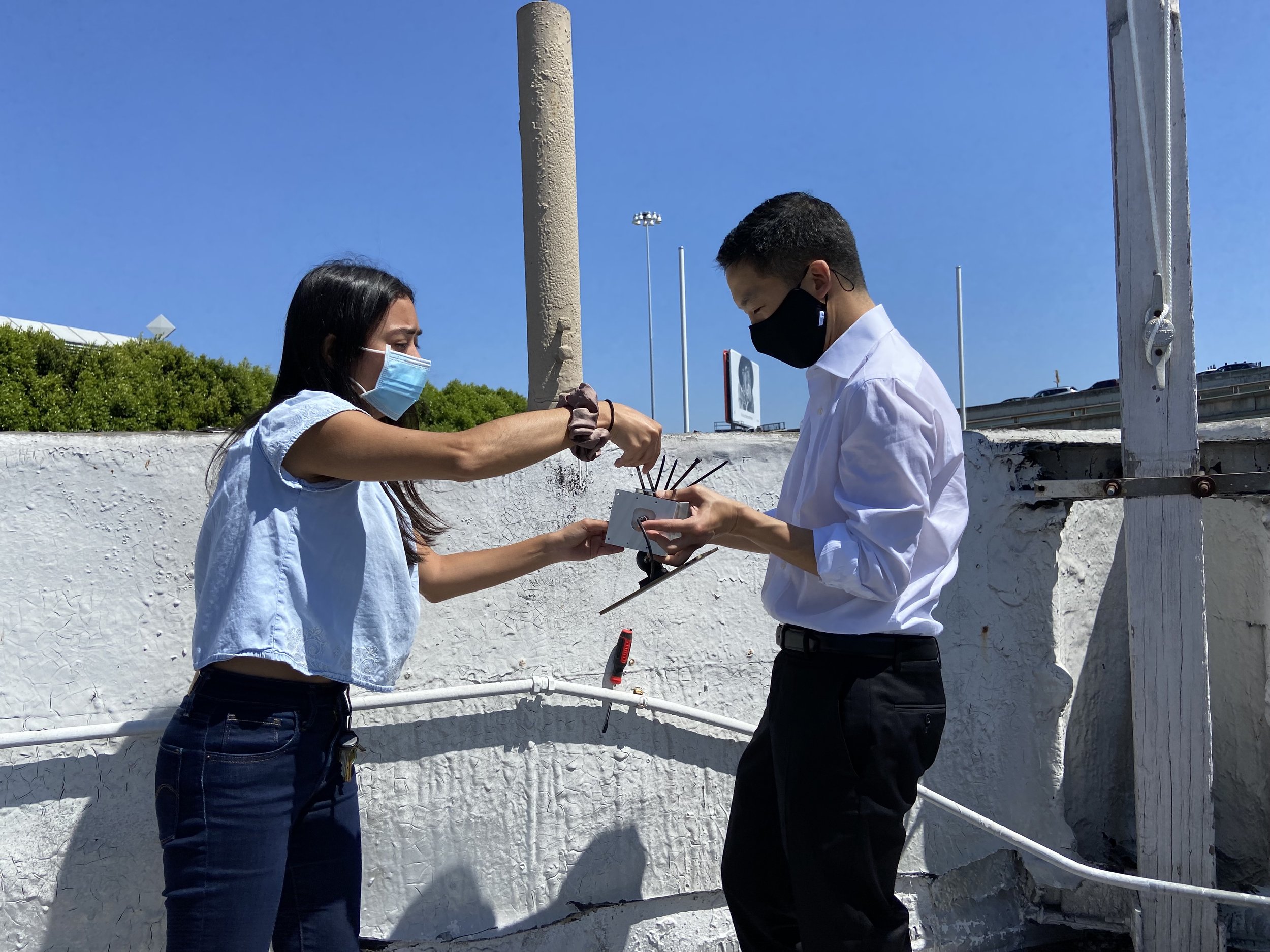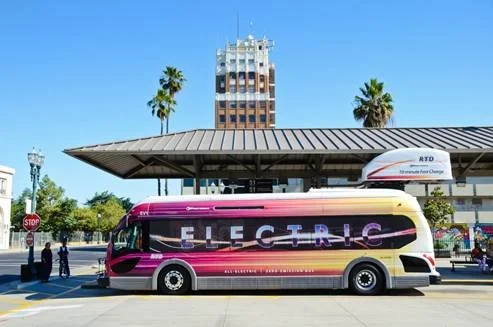In 2021, the Santa Barbara County Association of Governments completed the Cool Blocks Try Transit project, a neighborhood outreach and capacity building campaign supported by a $25,000 grant from the Low Carbon Transit Operations Program and in partnership with the Empowerment Institute’s Cool Blocks program. This project brought the participating 25-block neighborhood of Isla Vista together over a series of workshops to learn about and consider climate change mitigation and resilience measures they could adopt as individuals and as a community, which included using public transit. The project inspired the community to act, which in part led to their successful application to the Sustainable Transportation Equity Project, another California Climate Investments program.
Expanding Energy Storage and Microgrid Training and Certification
Using $1.25 million from the Low-Carbon Economy Workforce program, the Expanding Energy Storage and Microgrid Training and Certification project is increasing the number of participating Electrical Joint Apprenticeship Training Centers from six to 21 centers located across the State. These training centers will help electricians and apprentices earn a certification demonstrating they have the skills to safely handle and diagnose modern energy storage systems and battery technologies.
Demonstrating Emissions-Reducing Solutions for the Freight Sector
The San Joaquin Valley Flexible Solutions for Freight Facilities project, supported with $22.6 million in funding from the Zero-and Near Zero-Emission Freight Facilities Project along with $22.6 million in matched funds from project partners, demonstrated advanced technologies on locomotives and hybrid and zero-emission equipment around rail yards. For one part of this multi-component project, the Wabtec Corporation designed, manufactured, and commissioned a battery-electric locomotive to operate in tandem with two diesel locomotives from BNSF Railway, operating like a hybrid vehicle.
Healthy Soils Through Whole-Orchard Recycling
David Viguie of Viguie Farming is revitalizing soil health on 44 acres of a 28-year-old French prune orchard located in the city of Winters. Prior to receiving a Healthy Soils Program grant, David conventionally farmed his orchard. In his pursuit to restore the property's soil health, David applied to the Healthy Soils Program and received a $38,378 grant from California Climate Investments to achieve his goals of reducing greenhouse gas emissions and increasing soil carbon by removing a prune orchard through whole-orchard recycling.
Cleaner Passenger Trains through the Capitol Corridor Rail Project
In 2019, the Capitol Corridor Joint Powers Authority, in partnership with California Department of Transportation’s Division of Mass Transit, was selected by the Bay Area Air Quality Management District to receive $7.4 million from the Community Air Protection program to help replace two diesel-powered locomotives with two new Siemens Charger Tier 4 locomotives. These locomotives are now operating on the Capitol Corridor line from Auburn-Sacramento to Silicon Valley and run through disadvantaged and low-income communities in San Francisco, Oakland, Berkeley, and more. The new locomotives achieve a 90 percent reduction in particulate matter emissions and an 80 percent reduction in oxides of nitrogen emissions compared to the old, higher-polluting locomotives.
Collecting Air Quality Data to Improve Community Health in Eastern San Francisco
Brightline Defense, an environmental justice nonprofit organization, was awarded $300,000 from the Community Air Grants program to support the Brightline Air Quality Monitoring Program. This community-driven program that will install, collect, and analyze data from 15 stationary air quality sensors in heavily populated, low-income communities throughout Eastern San Francisco. The data these sensors collect are publicly available and can be used to help shape programs and policies to create cleaner air in these communities.
Launching a New Capacity Building and Community Empowerment Project
The Partners Advancing Climate Equity (PACE) pilot program is a capacity-building program administered by the California Strategic Growth Council and funded by the Greenhouse Gas Reduction Fund. The year-long pilot program began in 2021 and supported 22 participants – all local leaders deeply rooted in their communities across the state – and sought to increase their ability to advance equitable and community-driven climate solutions.
Advancing Ecological, Cultural, and Community Resilience with Tribal Nations in Southern California
With a $990,350 award from the Climate Change Research Program, the Resilient Restoration project – led by the Climate Science Alliance Tribal Working Group, University of California Riverside, and San Diego State University – is promoting Tribal resilience by developing knowledge and supporting actions that enhance persistence of cultural practices with a focus on preserving the ecosystems and species that are integral to Tribal communities.
Climate Resilience Planning for Key Sacramento River Watersheds
Supported by $400,000 from the Climate Adaptation and Resiliency Program, a coalition of federal, academic, non-profit and private organizations has developed a modeling tool to enhance climate adaptation and resilience planning in five Sacramento River watersheds. These watersheds provide the vast majority of California’s utilized water and over 80 percent of the freshwater to San Francisco Bay. By estimating the ecological returns of conservation and restoration efforts, the modeling tool will help determine what future actions and investments would best restore and protect the health of this important region.
Zero-Emission Forklifts Bring Air Pollution Reductions to Portside Communities
SSA Marine received $4.82 million from the Clean Off-Road Equipment Voucher Incentive Project, also known as CORE, to purchase 20 zero-emission forklifts and charging infrastructure for their locations in Stockton and West Sacramento. This equipment will help reduce greenhouse gases and air pollutants in census tracts that are heavily burdened by diesel particulate matter and other air pollutants.
Big Pine Paiute Tribe of the Owens Valley Community Transportation Needs Assessment
Using funds awarded by the Clean Mobility Options program, the Big Pine Paiute Tribe of the Owens Valley, a federally recognized California Native American Tribe, conducted a community-driven transportation needs assessment to determine the transportation needs and preferences of Big Pine Paiute’s residents. After the needs assessment is completed and approved by their Tribal Council, the Big Pine Paiute Tribe can use it to apply for additional funding from Clean Mobility Options or other transportation grant programs to implement clean mobility projects.
Supporting Families with Affordable Housing
Supported in part by nearly $23 million award from the Affordable Housing and Sustainable Communities Program, Resources for Community Development (RCD) will provide 87 affordable rental homes in the city of Berkeley through the Maudelle Miller Shirek Community project. In addition to large, family-sized apartments and permanent supportive housing for formerly homeless residents, the ground floor of the building will become the headquarters of Healthy Black Families, Inc., a South Berkeley-based nonprofit dedicated to the health of Black families in the community. This project will help Black families and formerly homeless individuals live healthier lives and receive health services through on-site programs and services offered by Healthy Black Families, Inc.,, RCD’s resident services, and the City of Berkeley Mental Health department and third-party service providers.
Promoting Transit Accessibility through the Solano Regional Transit Initiative
Thanks in part to over $4 million in funds from the Transit and Intercity Rail Capital Program, the Solano Transportation Authority has linked underserved parts of the cities of Vallejo and Fairfield to regional public transit services. This funding is supporting the $10.8 million Solano Regional Transit Initiative (SRTI), which is providing residents in Solano county with increased access to faster, more efficient transit options that reduce greenhouse gas emissions while connecting them to employment, health, educational, and other facilities that can improve their quality of life.
Turtle Rock Biomass Collection Site Helps Reduce Wildfire Severity
Alpine County was awarded $120,810 from the Fire Prevention Grants program to support the operation of The Turtle Rock Park Biomass Collection site. The facility provides communities in eastern Alpine County with a place to send green waste and biomass removed while creating defensible space around their properties to reduce the risk of future wildfire damage. By reducing the intensity of future wildfires, defensible space practices also reduce the emission of air pollutants and greenhouse gases.
New Community Composting Program Sequesters Carbon While Providing Local-Level Benefits
The California Alliance for Community Composting (Alliance)is helping community groups develop or expand 50 community composting sites in disadvantaged and low-income communities across California using funds from the Community Composting for Green Spaces Grant Program. Altogether, these sites are expected to prevent nearly 11,000 tons of organic waste from going to landfills by creating compost, which prevents the release of greenhouse gases during its decomposition. The Alliance’s work will also provide communities with additional benefits, including free compost, job training, and more.
Long Beach Urban Wood Recovery Apprenticeship Program Prepares Youth for the Future Workforce
Funded in part by a nearly $1,000,000 grant from California Department of Forestry and Fire Protection’s Urban and Community Forestry Program, the Conservation Corps of Long Beach (CCLB) is implementing an urban wood recovery apprenticeship program that has the potential to be a model for other programs across California. This program is teaching Corpsmembers how to remove hazardous trees throughout the city, control insects and diseases, and divert woody biomass from landfills to help keep greenhouse gases sequestered in the wood. Additionally, trees will be replaced to mitigate poor air quality, a lack of urban green space, and improve storm water retention in disadvantaged communities. Ultimately, this program will provide a foundation for Corpsmembers interested pursuing jobs in urban forestry.
Next-generation Refrigeration in New Stater Bros. Markets Grocery Store
Thanks to $50,000 from the California Air Resources Board’s Fluorinated Gas Reduction Incentive Program, Stater Bros. Markets installed a climate-friendly refrigeration system at a new supermarket in Whittier that will result in a reduction of greenhouse gas emissions that is the equivalent to taking more than 1,000 vehicles off the road for one year. Since refrigerants are among the fastest growing climate pollutants worldwide it is important to have projects like this one to demonstrate that transitioning the grocery sector toward cleaner refrigerants is an effective strategy for mitigating climate change.
Coyote Valley Prime Farmland Preserved in Perpetuity
Thanks to a $780,000 grant provided by the Sustainable Agricultural Lands Conservation (SALC) program, the Santa Clara Valley Open Space Authority (the Authority), in partnership with the Santa Clara Valley Transportation Authority and the Santa Clara County Planning Department, were able to purchase a 60-acre farm located in the Coyote Valley of Santa Clara County. This purchase adds to Coyote Valley’s growing network of protected lands and helps combat climate change by protecting prime farmland from being converted to more carbon-intensive land uses. This purchase also furthers the implementation of the comprehensive Santa Clara Valley Agricultural Plan finalized in January 2018, which Andrea Mackenzie, General Manager of the Authority defined as “a roadmap to protecting the multiple benefits that our region’s remaining farmlands and working lands provide.” This plan was also made possible by an award from the SALC program.
Expanding Capacity at the Turtle Rock Park Biomass Collection Site
The project is a continuation of the Turtle Rock Park Biomass Collection site which serves communities in eastern Alpine County. The facility provides a location to collect green waste and biomass that is cleared from private property to create defensible space and thereby reduce wildland fire risk.






















